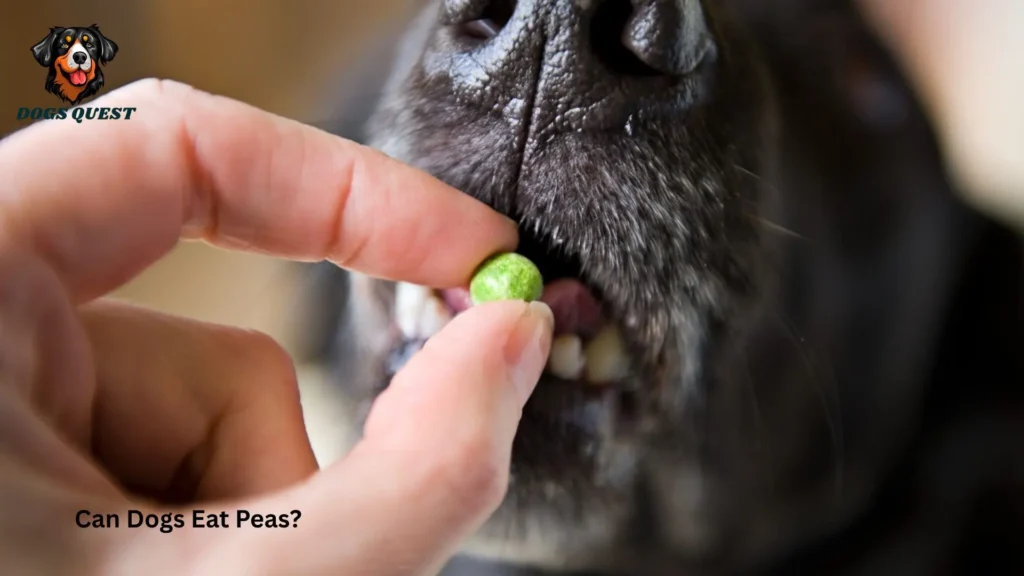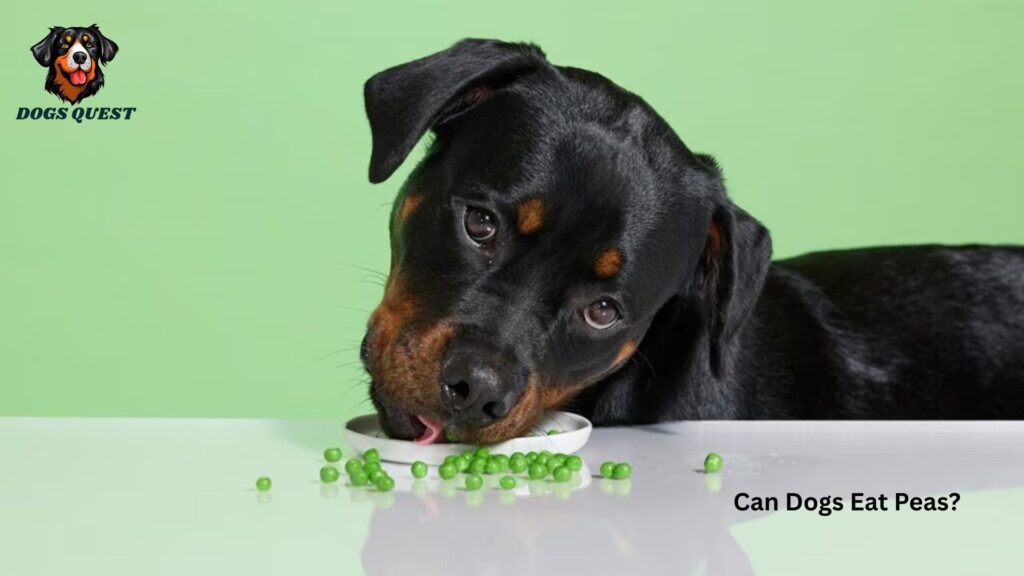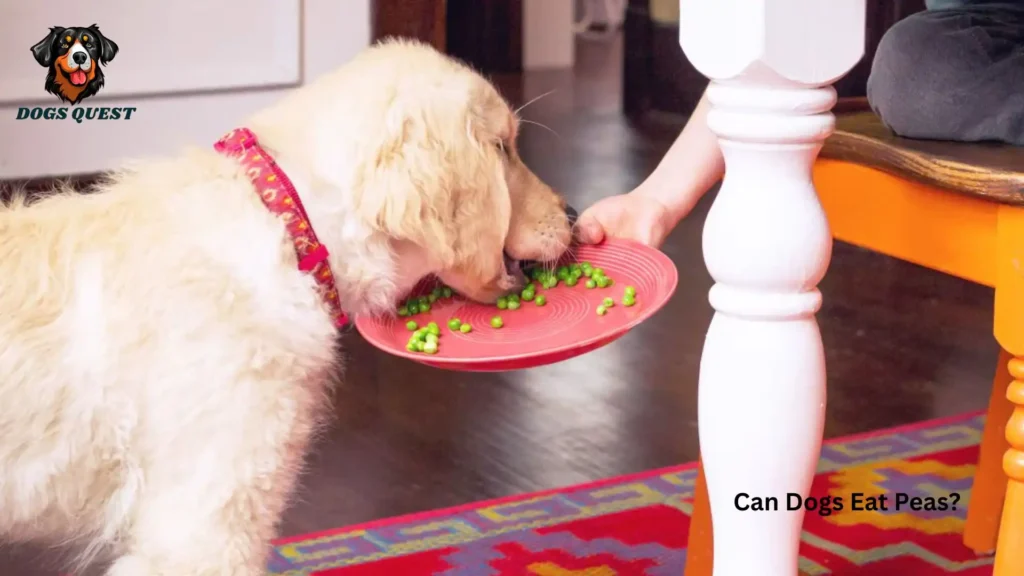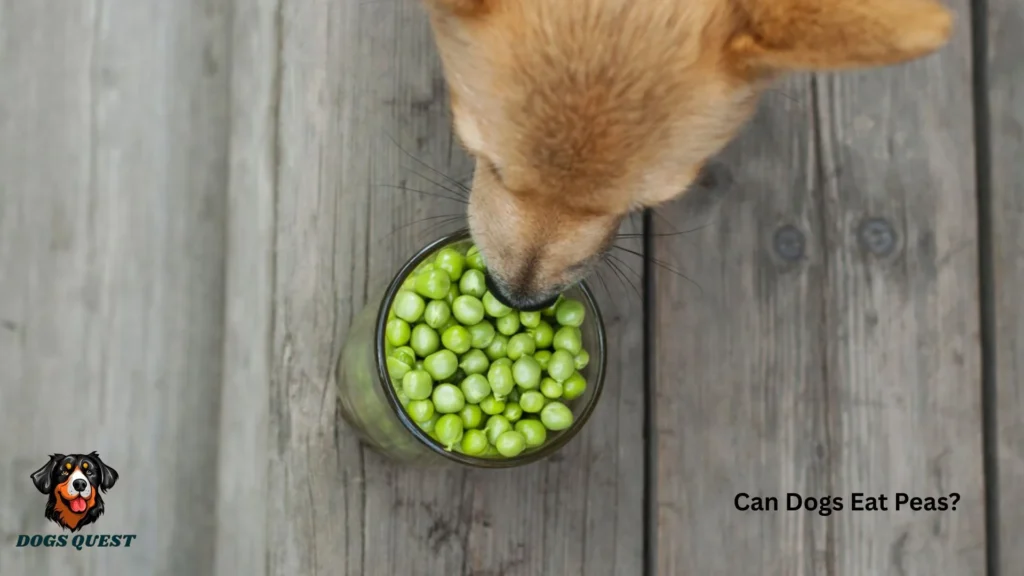Can Dogs Eat Peas? Learn 9 truths all owners need to know. Get to know how the advantages of peas include energy enhancement, better digestion, and healthy dogs without any medication.
Introduction:
Have you never noticed you can just watch your dog waiting to get some bite when you are eating peas?Can Dogs Eat Peas? Many dog owners see this as a usual sight and this usually results in one question, can dogs eat peas? The answer is in the affirmative, yes, dogs can have peas but they must be given in the right quantity and in an appropriate fashion. Peas can be a very healthy and nutritious supplement in the diet of your dog, but under some circumstances they may be inappropriate. This article dissects all that you need to know about peas as a dog food including their nutritional value to possible health hazards and all supported by a veterinary opinion and facts that are backed by research.
Can Dogs Eat Peas Safely?

Yes, it is safe to feed dogs on the fresh or frozen form of peas. The least dangerous ones are green peas, snow peas and sugar snap peas. All these are full of vitamins and minerals that are helpful in the overall well-being of your dog. Canned peas are however not preferred. They are usually packed with added sodium and preservatives that destroy the kidneys of your dog, thereby causing dehydration. Never feed your dog peas that are cooked with seasoning, butter, or oil.The American Kennel Club (AKC) says that, in general, plain and in moderation, peas are safe to feed to your dog.
In case of feeding the dog on peas, moderation is important. An overabundance of peas may lead to a belly ache in your dog, and that is particularly true when they are not used to having vegetables as a regular meal.Can Dogs Eat Peas?
The Reason behind Why Peas Are Superfoods to Dogs.

Peas are termed as the green multivitamin of nature due to their such amazing nutrient content. They have vitamin A, B, and K which aid in immunity protection, bone strength, and energy generation. They also contain high amounts of minerals such as iron magnesium and potassium, which help in promoting the well being of the heart and muscles. The pea fiber can regulate the digestion process and prevent constipation. Additionally, the protein level of peas makes them a helpful plant-based supplement option to repair and restore energy in the muscles of active dogs, particularly due to the presence of such vital vitamins as A, B, and K, which are necessary to ensure strong bones and energy in dogs.Can Dogs Eat Peas?
Can Puppies Eat Peas?
Peas can be given to puppies but in very low quantities. The digestive system of a puppy is not yet developed and excess fiber may result in loose faeces or stomach upsets. A teaspoonful of cooked, mashed peas in their food once a week or twice a week may be begun. As the puppy develops and adapts you can gradually raise the amount but peas must never substitute their primary puppy food and sources of protein. Can Dogs Eat Peas?
The Secret to A Healthy Pea and Kidney.

Peas have purines and these are nitrogen compounds that form uric acid when digested. Although this does not cause any harm to healthy dogs, it may be dangerous to dogs with kidney or urinary issues. An excessive level of purines may aggravate kidney disorders, as it augments uric acid accumulation. In case your dog has a history of kidney problems, it is recommended to approach your vet before you feed it on the peas. In the majority of healthy dogs, however, moderate quantities of peas are not at all dangerous.
The Debate on Peas and the Grain-Free Dog Food.
During recent years, peas have become one of the primary ingredients in a variety of grain-free dog food. Nonetheless, high concentrations of pea protein in the grain-free diets have been associated with heart conditions, including dilated cardiomyopathy (DCM). It is not the problems in peas and beans, but an excessive consumption of them in place of animal protein which becomes high in quality. In case you notice the presence of peas as one of the initial 3 ingredients in your dog food, then you had better speak with your veterinarian. The grain-free diets that contain high amounts of peas may be harmful, but more balanced and safer diets are based on meat and vegetable products.Can Dogs Eat Peas?The U.S. Food and Drug Administration (FDA) keeps investigating the possible associations of grain-free diets with high peas intake and heart diseases such as DCM.
The reason Overfeeding Peas May Lead to Digestive Problems.

Although the fiber composition of peas makes them good in digestion, excessive consumption proves otherwise. Excessive amount of peas may lead to gases, bloating and mild diarrhea. It should be introduced slowly always and watch how your dog reacts. The serving size would depend on the size and activity of your dog:
Small dogs: 1 table, twice weekly.
Medium dogs: 2-3 tablets twice a week.
Large dogs: ¼ to ½ cup, twice a week
The percentage of pea in the total diet of your dog should never exceed 10 percent.
Are Pea Pods Safe for Dogs?
Sugar snap peas and snow pea pods can be given to larger dogs since they can chew them, and digest them without a problem. However, smaller dogs have a likelihood of getting stuck in the pods and choking. Before serving it is safer to take out the pods or cut them into little bits. Always supervise your dog during these times of eating peas to avoid cases of choking.Can Dogs Eat Peas?
The most effective methods of feeding the dogs with peas.
When growing peas it is a matter of preparation. No oil, butter or seasoning of peas, cook or steam. You could even make them mashed in the food of your dog so that it is easily digested. There are also other ways in which peas can be combined with other vegetables such as carrots or be eaten with lean meat such as chicken or fish. Other owners also choose to freeze the peas and consume them as snacks, particularly in summer. These are healthy, low energy, and enjoyable natural snacks to dogs.Can Dogs Eat Peas?
Veterinarians and their opinions on Peas as Dog food.
The vast majority of veterinarians believe that in moderation, peas may be a healthy supplement in the diet of a dog. Veterinary nutritionists assert that fresh vegetables such as peas are good in diversifying nutrients in a dog and enhancing gut health. Dogs with chronic kidney, liver or heart conditions should however not be given peas unless recommended by a vet. Peas are not to substitute a high protein meat diet, but they are to add to it.Can Dogs Eat Peas?
Expert Feeding Tips
- In order to digest best always eat peas plain and cooked.
- Do not feed sodium on canned peas.
- Peas should be introduced gradually so as not to cause digestive discomfort.
- Observe the presence of allergies like itching or loose stools.
- A regular addition of peas to meal of your dog should be consulted with the vet.
Conclusion: The Eating of Peas by Dogs.
So, can dogs eat peas? Heavens, yes, so long as you feed them right and in due amount. Peas are rich in needed nutrients that may help your dog to live a healthy life but it should not be taken as an alternative to the meal. One should never use canned or salted peas and portions should be minimal. Through proper planning and moderation, peas may be made one of the most incredible natural delights in the diet of your dog. They are also a source of variety, nutritional and flavor which will make your pet remain strong, energetic and healthy.To know more about the foods that dogs can eat, check the official food safety guide by the ASPCA.Can Dogs Eat Peas?
FAQs:
Q1: Can dogs eat peas every day?
Dogs shouldn’t eat peas daily. While nutritious, too many peas can cause digestive upset or increase uric acid, affecting kidney health. Offer peas once or twice a week in small, plain portions.
Q2: Are frozen peas safe for dogs?
Yes, frozen peas are safe when thawed or steamed. They’re rich in vitamins and fiber, making a healthy, low-calorie treat. Avoid pre-seasoned or salted frozen peas.
Q3: Can puppies eat peas?
Puppies can eat small amounts of cooked peas. Start with a teaspoon weekly to test digestion. Peas help with energy, growth, and immunity when fed moderately.
Q4: Can dogs eat canned peas?
No, canned peas often contain excess salt and preservatives that can harm dogs. Choose fresh or frozen peas instead, as they’re healthier and easier to digest.
Q5: Are pea pods safe for dogs?
Only snow or snap pea pods are safe for larger dogs. Garden pea pods are tough and can cause choking. For small dogs, remove or chop pods before feeding.

